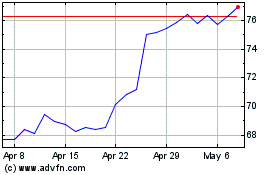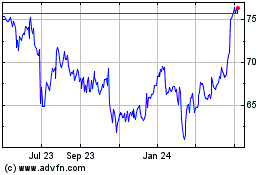Do J&J and AstraZeneca Vaccines Cause Blood Clots? What You Need to Know
April 13 2021 - 12:49PM
Dow Jones News
By Brianna Abbott
U.S. health authorities recommended that vaccination sites
suspend use of Johnson & Johnson's Covid-19 vaccine to
investigate rare cases of blood clots. The move comes after
European health regulators said they were probing reports of clots
among four people who got J&J's shot, while also looking into
clotting in people who had received a Covid-19 vaccine developed by
AstraZeneca PLC and the University of Oxford.
Why is the J&J vaccine being paused?
U.S. health authorities recommended the pause while they
investigate six reported cases of blood clots, including one death.
Six women, ages 18 to 48 years, were reported to have experienced
the clots as well as low levels of platelets, which help with
clotting. The cases were extremely rare -- more than 6.8 million
doses of the shot have been given in the U.S. so far -- but the
U.S. Food and Drug Administration said it was making the
recommendation out of an abundance of caution. Regulators and
researchers still don't know whether the vaccines cause the side
effects, or something else.
What are the symptoms of blood clots I should look out for?
If you've gotten the J&J vaccine within the past three
weeks, you should look for symptoms such as severe headache,
abdominal pain, leg pain or shortness of breath. If you have any of
those symptoms, which differ from the flulike symptoms that people
have reported following vaccination, you should contact your doctor
or other healthcare provider. For each of the six clotting cases,
symptoms occurred six to 13 days post-vaccination, whereas the
flulike symptoms tend to occur within a day or so of receiving the
vaccine.
But health authorities say there's no need to panic. For those
who got the J&J vaccine more than a month ago, the risk for
blood clotting is very low, said Anne Schuchat, the principal
deputy director at the CDC. People who recently received the
vaccine within the last couple of weeks and have any of those
symptoms should contact their healthcare provider and seek medical
treatment, Dr. Schuchat said.
How serious is the risk of blood clots? Don't all vaccines have
risk?
The risk appears low, given there were only a handful of cases
reported among the millions of doses given. And all drugs and
vaccines can come with risks. But health authorities want to be
especially careful with shots like the Covid-19 vaccines, which are
being given so widely, especially since there are alternatives
available. What is concerning about the clotting and low-platelet
counts seen in the six women is that they require a different kind
of treatment than normally given. The FDA and CDC told doctors to
avoid a blood thinner called heparin.
Who is most at risk?
It is still unclear. The six cases all occurred among women
between 18 and 48 years, suggesting younger women might be at
higher risk. A similar pattern was seen with clotting side effects
among people given AstraZeneca's Covid-19 vaccine. In fact, the
United Kingdom's medicines regulator recently recommended that
people under 30 years shouldn't get the AstraZeneca shot, while
Canadian authorities urged restricting use to people under 55
years.
How is J&J's vaccine different from the others that are
available?
The J&J vaccine, like the shot from AstraZeneca, uses a new
technology to help people's immune systems mobilize against the new
coronavirus. The two viral-vector vaccines contain a virus that
causes the common cold, but which has been rendered harmless. That
virus is engineered to include genetic instructions that trigger a
protective immune response. The Pfizer and Moderna vaccines use a
different technology, called messenger RNA, to achieve the same
goal. Researchers are investigating whether the viral-vector
technology may play a role in the clotting side effects.
Should people who want a one-shot vaccine keep waiting, or get
an mRNA vaccine?
Health authorities have been encouraging people to get
vaccinated as soon as they can, regardless the make of the shot.
And the pause may only last a few days, as the FDA and CDC
investigate. While the FDA and CDC are recommending the pause, it
isn't a mandate, said the director of the FDA Center for Biologics
Evaluation and Research, Peter Marks. "On an individual basis, a
provider and patient can make a determination whether or not to
receive the vaccine," he said.
Write to Brianna Abbott at brianna.abbott@wsj.com
(END) Dow Jones Newswires
April 13, 2021 12:34 ET (16:34 GMT)
Copyright (c) 2021 Dow Jones & Company, Inc.
AstraZeneca (NASDAQ:AZN)
Historical Stock Chart
From Mar 2024 to Apr 2024

AstraZeneca (NASDAQ:AZN)
Historical Stock Chart
From Apr 2023 to Apr 2024
